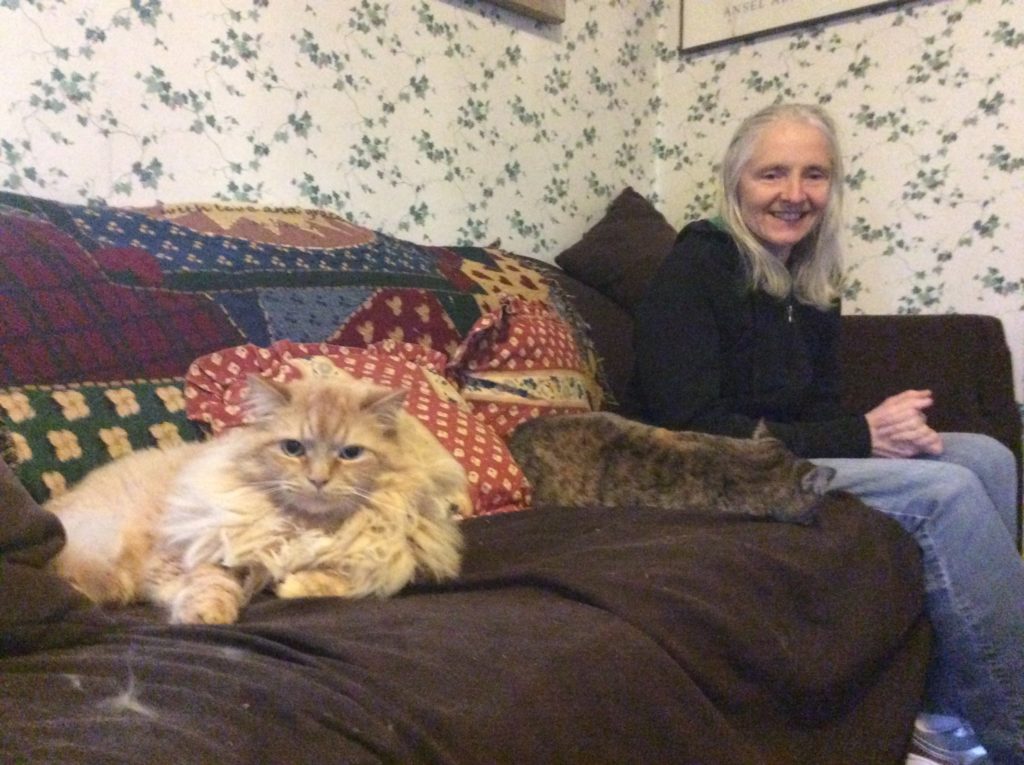The pets that affect Cindy’s life the most in recent times are Garfield and Elphaba, our two Maine Coon cats, and Gus, the Black Labrador up the street.
I would like to say Gus took a special liking to us, but in reality probably everyone in the neighborhood feels that way. As we walked up Emerson Street and turned the corner we usually would see Gus lying on the porch. Upon seeing us he would get up and saunter down the steps to greet us. I would help Cindy step up the curb onto Barbara and Tom’s lawn to meet Gus halfway.
Gus always turned his body sideways to me while looking up at Cindy. I often wondered whether he did that because he knew I was more capable of petting, or because Cindy’s smile emanated more warmth. I also wondered what he knew or understood about Cindy’s condition, whether her deterioration over time was as obvious in dog years as in human time.
I realize I am using past tense. As winter is upon us we do not get out much now. Gus was twelve with some ailments when we last crossed paths. There is no guarantee we will cross paths again, though I do not know which of the two will depart from Emerson Street first.
I do know who will go first between Cindy and our two cats, the latter being only about five years old. They have been wonderful to have around the house, particularly for Cindy. They wait for me to situate Cindy on the living room couch, then virtually pounce on her lap for an extended stay of petting and snuggling.
I would like to think they realize they are providing pet therapy for Cindy, that they know and understand a little of what is going on with her and seek to provide as well as receive comfort. Such speculation gets challenged by Garfield whenever we go down the stairs.
We must go very slow, Cindy’s arms draped over my shoulders, my hands guiding her legs down one step at a time as I back down in front of her. Garfield used to wait for us on the landing, where he would insist on being petted for awhile. Cindy would attempt to pet him by rubbing or patting my head while I petted Garfield. Now because we go so slow our needy cat accosts us almost every step, seizing opportunities for me to give him a scratch at almost every step. No, he doesn’t quite understand what is going on, at least not well enough, and he’s the smarter of the two.
We spend an ever increasing amount of time upstairs, in a bedroom I converted into a den. If future necessity prevails I can easily transport Cindy from bedroom to bathroom to entertainment room without ever having to go downstairs. I’ve already made abundant use of a serving tray for bringing meals upstairs. Alzheimer’s is a disease of continual transition.
This deprives the cats of some of their “lap time.” In response Garfield comes to the gate at the top of the stairs and stares at us with his “puss ‘n boots” eyes. One time I found myself staring back, gazing and wondering how the cats will react when Cindy’s gone. Will they miss her? Will they remember like the famed dog Hachi? Will there be an emptiness for them?
One might find this crazy, that I am concerned about how the cats will feel more than my own future feelings, but I would say that attitude is precisely why I am able to be a good caregiver. We all have troubles. Dwelling on your own troubles leads to depression, proven to be extremely unhealthy. Focusing instead on the troubles of others, if wise and deliberate in the focus, still keeping an eye towards ones own autonomy and quality of life, leads to health for a species once meant to be altruistic. Whatever our favorite pets may or may not know, that’s one lesson at least that we might relearn from them.

